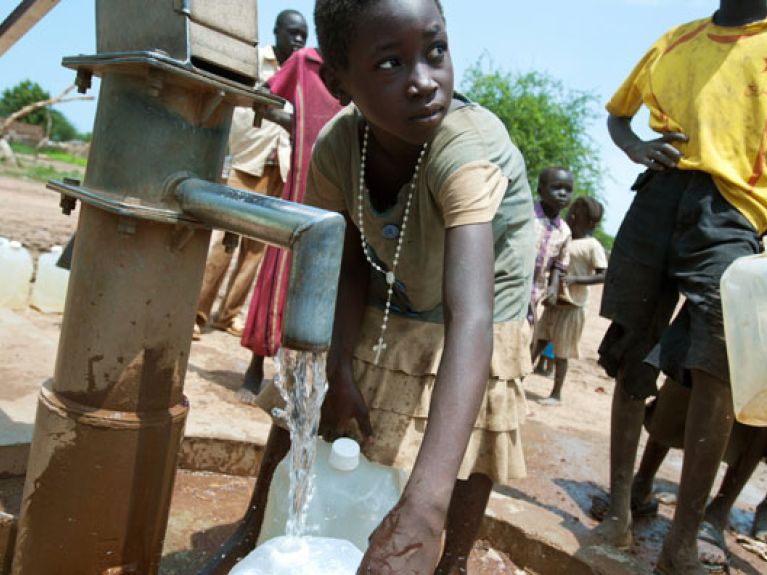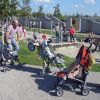Enabling refugees to make a new start
An initiative of the Federal Ministry for Economic Cooperation and Development (BMZ) aims to help combat the causes of forced displacement – and mitigate the consequences.

Always having to move on, always running away – for Severina William this was normality for a long time. During the civil war in South Sudan she repeatedly had to flee from armed groups. Now, on the outskirts of the town of Ibba in the south-west of the country, she has found a new home – and an opportunity to grow her own food and earn some money. This new chance was made possible by a project that helps refugees to make a new start: a farmer field school.
The school teaches her all she needs to know to be a successful farmer. She is learning how best to sow the seeds, harvest the crops at the right time, and store the harvested crops properly. The school provides her with the seeds and tools she needs. “Soon we will be able to provide for ourselves,” says Severina William.
But she is not only person who is benefiting from the new knowledge. The participants at the farmers field school also pass on their skills to others. In this way the farmers can gradually increase agricultural production in the region and supply food to more and more people. More than 45,000 people – taking farmers and family members together – have already benefited from the scheme. Almost 7,000 smallholder households have been trained in farming and vegetable cultivation. Crop yields have risen by as much as 20 percent.
The farmer field school is an example that shows how refugees can be given new prospects for a self-determined life. It is part of a Special Initiative of the Federal Ministry for Economic Cooperation and Development (BMZ) called “Tackling the root causes of displacement – reintegrating refugees”. The Special Initiative supports people in 19 countries as well as several international projects. In addition to South Sudan, these countries include Somalia, Chad, Uganda and the Central African Republic. A total of 330 million euros has been set aside for the initiative, which was launched in 2014. The individual projects run for up to five years.
“With its Special Initiative, the BMZ wants to help ensure that conflicts do not occur in the first place, let alone escalate and force people to flee their homes,” says a Ministry spokesperson. “At the same time the BMZ wants to help mitigate the negative effects of refugee movements for all the people concerned.” The aim is to work together with the partners to tackle the root causes of displacement and stabilise the host regions. The initiative also aims to help the people to integrate into the new home country – or get back on their feet again in their old home country.
Projects have been launched in various fields to achieve these objectives. The Ministry funds training schemes and helps men and women to attain further qualifications. The Initiative improves water supplies and healthcare services and offers psychological assistance. Peace and reconciliation projects also play a part. In the sub-Saharan Africa region, for example in South Sudan, drinking-water and sanitary facilities are being built for 36,000 displaced people and the local population. In Mali and the border region with Niger, young people are learning a trade. And in the Central African Republic schools for more than 50,000 children are being rebuilt.
The idea for the Special Initiative came against the background of the increasing numbers of refugees, who currently number about 60 million worldwide. They leave their homes because they are in a war zone, or because they are persecuted or suppressed. They are fleeing violence or the consequences of climate change. Nine out of ten refugees live in developing countries.
These host regions need support, stresses Steffen Angenendt, migration researcher at the Stiftung Wissenschaft und Politik (German Institute for International and Security Affairs, SWP). “There are often not enough schools, only poor healthcare services, and no functioning administration,” Angenendt adds. The refugees often lived in these regions for a long time. “They must therefore be given prospects locally,” otherwise they would set off again. “Migration research shows that anyone who has already been displaced once is more likely to move on a second time,” says the scientist.
Education and training efforts in particular pay off, Angenendt underlines: “Many young refugees have not been to school for a long time. If they don’t get help, they won’t be able to use their potential, so that a lost generation will grow up.” The support was also very important because the migrants were often competing for resources with the local population. This could lead to conflicts, for example over food and education.
In order to combat these conflicts, the BMZ collaborates with different partners in the Special Initiative. These include the European Commission such government organisations as the KfW Bankengruppe (formerly Reconstruction Loan Corporation) and the German Society for International Cooperation (GIZ). Further partners include the United Nations, universities, think tanks, non-governmental organisations, foundations, churches and the governments of the countries affected.
The Special Initiative is only one component of the BMZ’s efforts to offer refugees new prospects. In total, the Ministry will be spending more than 12 billion euros in countries of origin and host countries during this legislative period – and in this way continue to assume international responsibility .

